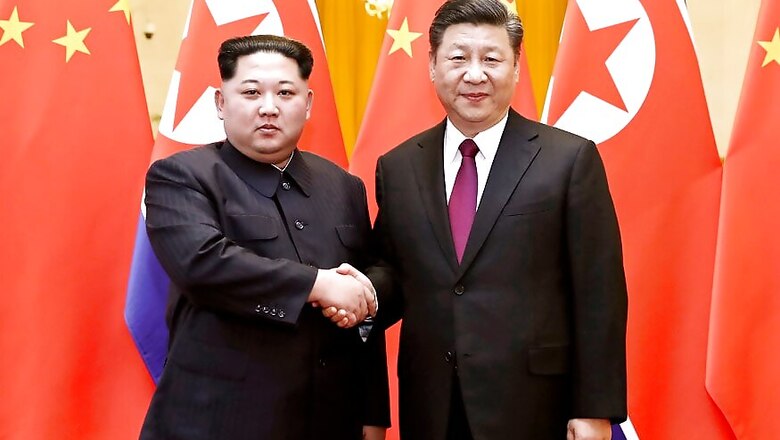
views
New Delhi: North Korean Leader Kim Jong Un was in Beijing for three days, marking his first foreign visit since assuming office in 2011. The fact that it took well over seven years for him to make his first foreign trip and that it was to Beijing underlines how much the world has changed in these last few years.
Kim’s visit was shrouded in secrecy. Reporters got a whiff when a swanky train from Pyongyang was spotted in Central Beijing — the same locomotive used by Kim’s father Kim Jong Il on the numerous occasions he visited Beijing during his reign.
Kim senior’s visits to China were only made public after the visit was over and he returned to Pyongyang. The same protocol seems to have been followed with Kim junior, as Xinhua — China’s official news agency — only put out pictures of Xi-Kim meet after the visit was over.
It also underlines how China’s profile under Xi Jinping has completely changed. China is now unquestionably a superpower, perhaps at par, if not within striking distance, of the United States.
Kim’s visit comes just days after US President Donald Trump made a surprise tweet announcement of a breakthrough with Pyongyang and a possible summit with Kim by May. But by visiting Beijing first, China has forced the world, including the US, to acknowledge the Asian country’s primacy in resolving the North Korean nuclear issue.
China under Xi Jinping is not just an economic powerhouse, it is also increasingly calling the shots on geopolitical and strategic questions. China has already altered the status quo in its territorial disputes in the South and East China Seas.
Despite an unfavourable ruling by the United Nations’ Tribunal on the Seas, China has managed to win over Philippine President Rodrigo Duterte to its side. Even Japan, despite its historic animosity with China, is coming around to acknowledging Beijing’s increased footprint in East Asian affairs.
With India too, China became increasingly bellicose in the Doklam standoff last year. And though India stood her ground, the fear in South Block is there could be a repeat of last year’s faceoff once the snow melts. There is growing evidence of a massive military infrastructure build up on the Chinese side of Doklam including two helipads.
India seems to be re-setting its ties with China under the new Foreign Secretary Vijay Gokhale.
He managed to convince the government to keep this year’s Tibetan celebrations low key, even getting the Cabinet Secretary to issue a letter desisting senior BJP functionaries from attending any Tibetan event.
Part of this reset is born of the belief that India had needlessly provoked Beijing last spring with a much-publicised visit of the Dalai Lama to Arunachal and the rest of North East. But whether this reset will pay off, and will China look at India more favourably, remains to be seen. The die has been cast. Now it’s Beijing’s turn.
















Comments
0 comment